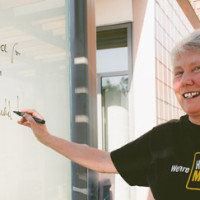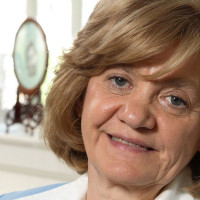Highlight on Grad Cohort Alum, Carole-Jean Wu
Carole-Jean Wu is a Ph.D. candidate in the Electrical Engineering Department of Princeton University. Her research focuses on shared resource management for Chip-Multiprocessor (CMP) systems. In particular, she investigates software and hardware techniques to assist the management of the last-level shared caches, targeting performance throughput and guaranteeing quality of service.
She is also interested in techniques that exploit potential parallelism hidden in multi-threaded applications on CMP systems. Carole-Jean Wu has interned with Intel, IBM, and Google and is the recipient of the 2011-12 Intel PhD Fellowship Award. Prior to Princeton, Carole received her B.S. degree in Electrical and Computer Engineering from Cornell University. Carole has attended three CRA-W Graduate Cohort work-shops, where in 2009 she presented with Janie Irwin on confidence building. She also participated in CRA-W’s Career Mentoring Workshop (CMW).
Q: How did you become interested in pursuing a research career in computer science?
When I was an undergraduate student in Cornell’s ECE, I participated in the cooperative program between Cornell and industry. Via this program, I had two internships at Intel (Software Solutions Group in Chandler, Arizona), where I had the opportunity to work on hardware platform trace generation and system performance analysis. Through these experiences, I became interested in computer architecture. Thus, after returning to Cornell, I decided to take more advanced, elective courses to strengthen my background in computer architecture. Furthermore, to figure out whether research was the “right” path for me, I chose to work with Professor J. Martinez on a research project funded by Intel. This later became my undergraduate honors thesis, namely “Predictability of Microprocessor Cache Miss Values”.
I found computer research to be intriguing and challenging. A lot of research involved real-system implementations or full-system simulation. I enjoyed collecting and analyzing data that supported my research assumptions and I loved the process of building computer systems.
Q: How did you decide where to apply for graduate school and what was your rationale for your final choice?
Since I knew that I’d like to pursue a research career in computer architecture related fields, I sought advice from my academic and research advisors at Cornell and applied to top-ranked schools in computer architecture.
After visiting a few schools during their open houses, I had a clearer picture of the kind of professors I’d like to work with in the future. This was a determining factor for my decision. Another important perspective for me was the availability of funding and the teaching requirement. Considering all these factors, I decided to join Princeton’s EE. This was primarily because there are many active distinguished computer architects in this department. On top of that, while each professor focuses on a specific topic in computer architecture, the department offers a diverse mixture of research opportunities. Furthermore, Princeton is generous and provides Graduate Fellowship Awards to all first year graduate students. This gave me the freedom to explore and pick the right match for my PhD advisor.
Q: Any retrospective thoughts or advice on how someone applying to graduate school should approach the problem of selecting where to apply and where to go?
If you already have a research field in mind, I suggest applying to schools where there are professors actively conducting research in relevant topics. If you are undecided, I would advise to apply to schools where there is a diverse range of choices and professors whom you are interested in working with in the future. Before making the final decision, I strongly recommend that all prospective students visit the schools and seek opportunities to talk to professors (as well as graduate students) they are interested in working with.
Q: Can you tell us a little about your research and how you chose your research topic?
I am broadly interested in computer architecture with an emphasis on shared resource management for chip-multi-processor systems. In particular, I am investigating software and hardware techniques to assist the management of the multi-level cache hierarchy, targeting performance throughput, quality of service, and fair sharing. I am also interested in techniques that exploit potential parallelism hidden in sequential and parallel applications.
My internships with Intel and undergraduate research experience made me interested in exploring architectural designs that can influence the performance of computer systems. As I delved deeper into identifying the limiting factors for performance, I found that resource management for the scarce on chip shared caches and memory bandwidth plays a key role. This led to my first research project, where I used time counters to retain high-priority and good-locality data in the shared cache.
Q: Do you have any insight to share with graduate students who might strive to replicate your success?
I want to encourage students to be immersed in a research project as soon as possible. This allowed me to learn whether going to graduate school was the right path for me and also to experience the process of evaluating the potential of a research idea early. In addition, I would like to encourage graduate students to seek internship opportunities. In the early PhD years, it is important to diversify a student’s research interests and sharpen her technical skills by interning in industrial research labs. Toward later years, it is critical for a student to pick the “right” industry research lab to intern with. It is the best (if possible) to intern with researchers whose work aligns well with the student’s dissertation research.
It is also important to attend conferences and seek mentors when possible. While nurturing a good professional network takes efforts and time, it creates future collaboration and job opportunities. My final piece of advice is to do what you love and to love what you do.
Q: Life as a graduate student can be quite stressful. What are some of the ways in which you have managed to stay focused and strike a balance?
I enjoy hiking and traveling, which helps me recharge after exhausting paper deadlines. For other frustrating moments in graduate school, I have a few cheerful friends Carole-Jean enjoys hiking to chat with and I can always talk to my mentors if I need technical advice. Luckily, my family has been my biggest cheerleader in graduate school.
Q: What challenges do you think you will face (or are currently facing) in your job search?
The biggest challenge in my job search is to cope with the tight travel schedule. I am interviewing for positions in both industry research labs and academia and hoping to synchronize the interviews as much as possible to ease my decision making. This, however, creates a lot of stress, since I am also revising my thesis at the same time. The advice I am getting is to stay healthy and enjoy these visits as much as possible.
Q: What impact has your involvement with CRA-W had on your career?
I am very grateful to have been part of CRA-W’s Grad Cohort Workshops 2007—2009. The Grad Cohort sessions prepared me well for upcoming challenges, which I did not know I was going to face until the later years of my PhD. It also offered me an invaluable opportunity to network with other women in computing. Finally, learning the success stories of so many outstanding women in computing was fascinating and encouraging during stressful moments of my PhD life. I was invited to give a speech at the Grad Cohort Workshop in 2009. I gave a joint presentation with Professor Mary Jane Irwin on confidence building to over 200 attendees from all around the world and we shared our experiences as women in computing technology.
Q: Do you have any other involvement in activities supporting women in computing?
I helped in organizing the New York City Girls Computer Science and Engineering Colloquium, in which female engineers presented their research to high school girls, in an effort to help them gain more interest in learning math and science. In addition, I am an active member of Princeton’s Graduate Woman in Science and Engineering (GWISE). I hope to continue supporting and motivating women to pursue majors in science, technology, engineering, and mathematics through future teaching and mentoring opportunities.
Q: Finally, what do you do for fun?
I love hiking, skiing, and traveling. Around Princeton, there are many beautiful hiking trails along the Appalachian Trail, which over the winter are converted to skiing trails. I take advantage of the mountains here for hiking and skiing during the different seasons. Also, over the years in Princeton, I have done three cross-country road trips with different routes. This gave me the opportunity to go hiking in different places in the country and visit various national parks with Yellowstone National Park as my all time favorite.






